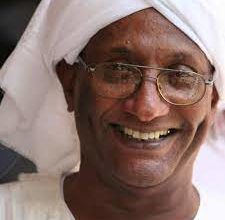When it is very dark, we miss “Save Darfur” (2004) (1-2)

Abdullah Ali Ibrahim
The editor of the New York Times, author of the book “Artillery of Journalism” (1967), James Rustin, said that news is not something abstract except at the end point among its receivers, but in its area of origin it is relevant to sociology. That is, the news comes out to the world from the core of a social entity with the imprint on it from the relationships of a social entity. But these contexts are removed from the news as it reached the listener who replaces it with another sociology, emanating from the sociology of those who hear it from the media.
And am not aware of any academic such as the Ugandan Ugandan academic Mahmoud Mamdani who was able to handle this distinction between the news and the sociology when he debated the issue in his book titled “of this distinction between news and its sociology in his book “Saviors and saved: Darfur, Politics, and the War on Terrorism” (2009). He subjected the quality of knowledge about Darfur behind the activity of the American “Save Darfur” organization, which was established in 2004 to express solidarity with Darfur during its first catastrophe, to the test of the paradox between the news at its origin and the news in its endpoints among the audience. And you will find that he hit the target, verily.
We begin by listing the activities undertaken by the organization according to Mamdani’s monitoring.
The “Save Darfur” campaign mobilized by the organization was one of the most successful American mass campaigns to stand with a general cause after the campaign against the Vietnam War. The organization mastered the art of mobilizing for the cause. So, it setup a website. Generous advertising resources are mobilized in newspapers, television and signboards. Postcards calling for “one million votes for Darfur” were used. Yellow posters were distributed with numbers from one to 400,000, the last number being a statistic of those killed in Darfur. It made one day in April 2006 International Darfur Day, and a crowd gathered in New York’s Central Park, demanding United Nations intervention in the Sudanese region. A full page advertisement was repeatedly published in the New York Times calling for international intervention to prevent the killings in Darfur, and authorizing the interveners to open fire and eliminate those responsible for the Darfur Holocaust in the context of the organization’s demand that the Security Council imposes a no fly zone over the skies of Darfur, and that NATO appoint African Union mission in Sudan to enforce that ban. Rather, the organization’s call in the face of America’s war in Iraq, which took place at the same time, was: “Leave Iraq, and let the soldiers’ shoes set foot in Darfur.” When President George W. Bush imposed the boycott on Sudan, “Save Darfur” did not agree with this, and it said that it was not very little, but also too late.
“Save Darfur” was popular among students. This mobilization began among them with a meeting at the Holocaust Museum in Washington with a group of them in September 2004, from which energy spread throughout the entire student body to the point that they formed their independent organizations to save Darfur at Harvard University in 2005 to expand to 26 other universities and build 600 branches. As a result of the “Save Darfur” mission, an organization specialized in boycotting companies wishing to invest in Sudan emerged. Stars of artists flocked to it. Angelina Jolie and Brad Pitt donated one million dollars to charitable organizations in Darfur. George Clooney, Brad Pitt, and Matt Damon created an association calling for the initiative to stop the massacres in Darfur under the name “Not During Our duty time.” Clooney and his father visited Darfur, and Clooney returned to talk about his visit to Oprah Winfrey. America even invited Clooney to address the United Nations about the plight of Darfur. Thanks to the strength of the campaign on public opinion, the US Congress made July 16 and 17, 2005 a national end of the week to pray for Darfur and reflect on its plight.
The “Save Darfur” campaign was nominated against China, which had already committed atrocities in Tibet. The organization became associated with the Tibet issue in order to support China, which had organized the Winter Olympics in 2006. As a result of the campaign, one of the American Olympic stars donated a prize he had won to refugees from Darfur. Star Mia Farrow, who visited Darfur, called the Winter Olympics the Holocaust Olympics. The campaign against China faded away due to its strong stance that what happened in Tibet was an internal matter and had nothing to do with it.
If you want today, when Darfur is in this difficult situation, to see what shall Save Darfur organization do towards it, you will find its website is still online, but, according to its people, it is inactive. While the sociology of the Darfur plight and all its evils remained, as we saw in this sinful war, the news dissipated. This is another sociology about those who failed this time to save Darfur.
To be continued



